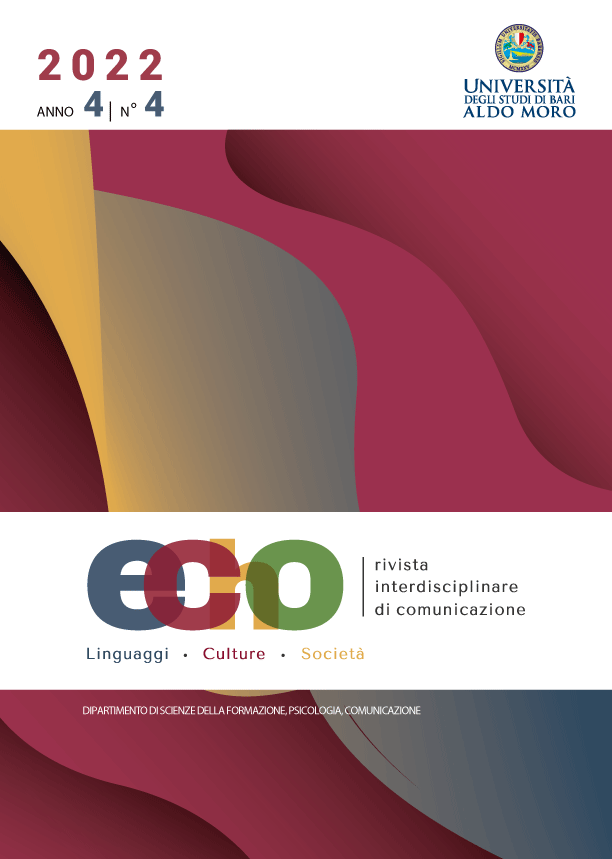La metafora del viaggio come esperienza conoscitiva nella Svezia postmigrante: il caso di "Kan du säga Shibbolet?" di Marjaneh Bakhtiari
DOI:
https://doi.org/10.15162/2704-8659/1546Parole chiave:
Swedish literature, Postmigration, Marjaneh Bakhtiari, Postmemory, Imaginary Homeland, Letteratura svedese, Postmigrazione, PostmemoriaAbstract
In the novel Kan du säga Schibbolet? (2008) (Can you say Shibboleth?), Marjaneh Bakhtiari focuses on the topic of travel, creating a bridge between Sweden and Iran. Through the experience in Tehran of the sisters Baran and Parisa, who were born in Malmö to Iranian exiles, the author interweaves intergenerational experiences and narrates the journey as a metaphor for dislocation of identities and discovery, both individual and 'familial and collective' (Ciaravolo 2017, p. 51). The journey of the two sisters represents the crossing of a narrative-discursive threshold set by their parents, who recall the terror of the theocratic oppression of post-revolutionary Iran. By discovering the present-day Iran, the two sisters move beyond their parents' prejudices and fears towards a homeland now lost and only 'imagined' (Rushie 1991), then going back to Sweden with new and unexpected perspectives on Iran. This study aims to highlight how Baran and Parisa, through the insightful experience of travel, experience the difficult coexistence and silent cultural opposition of the younger generation to the theocratic regime. Furthermore, it will be shown how Bakhtiari, through an intergenerational perspective shift, thanks to old photos, allows for the examination and reconstruction of the past, opening up new spaces for identity negotiation, both for the diaspora and post-migrant generations. Methodologically, this contribution relies on Marianne Hirsch's concept of post-memory, in order to answer the following question: "does the distance open any other doors?" (Rushdie 1991, p. 13). By analyzing the experience of re-discovery and re-rooting, both in Sweden and in Iran, we understand that Baran, Parisa and the parents are authentic destinerrant subjectivities (Derrida 1997) who, in their journey from Sweden to Iran and vice versa, confirm "the notion that something can also be gained" (Rushdie 1991, p. 17).
Nel romanzo Kan du säga Schibbolet? (2008) (Sai dire Shibboleth?, Marjaneh Bakhtiari pone al centro il tema del viaggio creando un ponte tra Svezia e Iran. Attraverso l’esperienza a Teheran delle sorelle Baran e Parisa, nate a Malmö da esiliati iraniani, l’autrice intreccia esperienze intergenerazionali e racconta il viaggio come metafora di dislocazione e scoperta identitaria, sia individuale che “familiare e collettiva” (Ciaravolo 2017, p. 51). Il viaggio delle due sorelle indica il superamento di una soglia narrativo-discorsiva predisposta dai genitori, che ricordano con terrore l’oppressione teocratica dell’Iran post-rivoluzionario. Scoprendo l’Iran odierno, le sorelle si inoltrano al di là dei pregiudizi e delle paure genitoriali verso una patria ormai persa e soltanto ‘immaginata’ (Rushie 1991), tornando in Svezia con prospettive nuove e inaspettate sull’Iran.
Questo studio si propone di evidenziare come Baran e Parisa, attraverso l’esperienza conoscitiva del viaggio, osservino la difficile convivenza e la silente opposizione culturale delle giovani generazioni al regime teocratico. Inoltre, si mostrerà come Bakhtiari, attraverso lo shift prospettico intergenerazionale, testimoniato da vecchie fotografie, permetta di esaminare e ricostruire il passato aprendo nuovi spazi di negoziazione identitaria, sia alle generazioni della diaspora che a quelle postmigranti.
Metodologicamente, il contributo si avvale del concetto di postmemoria di Marianne Hirsch, cercando di rispondere alla domanda “does the distance open any other doors?” (Rushdie 1991, p. 13). Analizzando l’esperienza di ri-scoperta e ri-radicamento, sia nel sistema di riferimento svedese che in quello iraniano, si giungerà infine alla risposta che Baran, Parisa e i genitori siano autentiche soggettività destinerranti (Derrida 1997) che, nel passaggio dalla Svezia all’Iran e viceversa, confermano “the notion that something can also be gained” (Rushdie 1991, p. 17).








